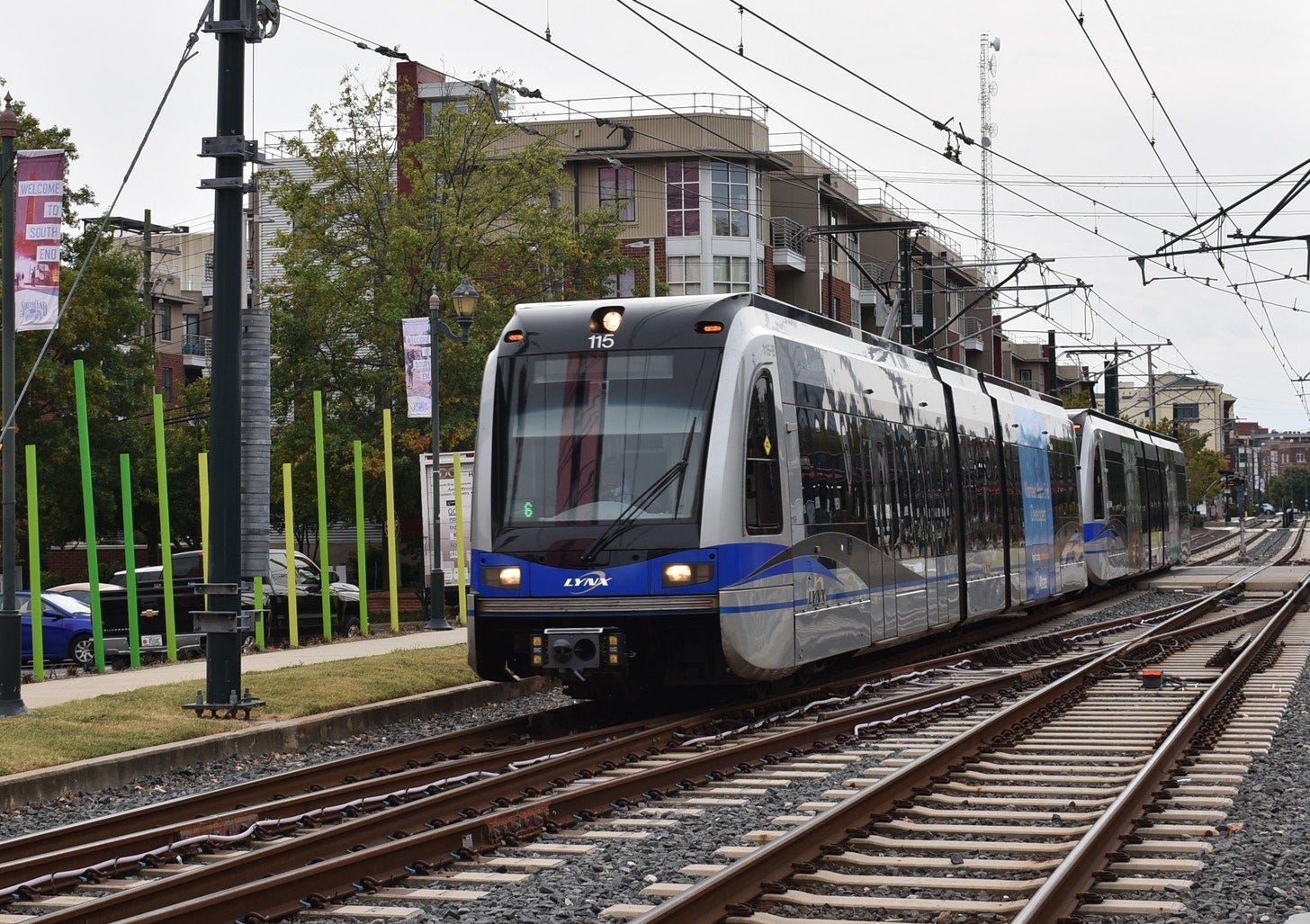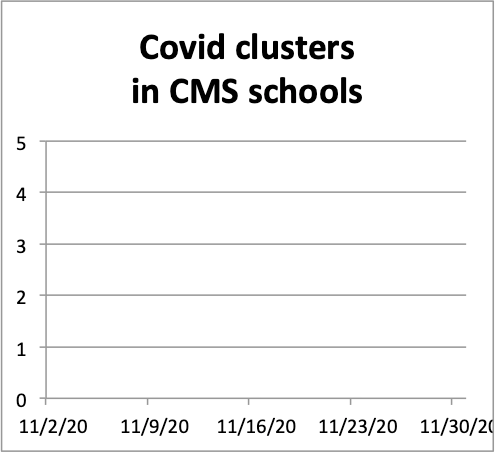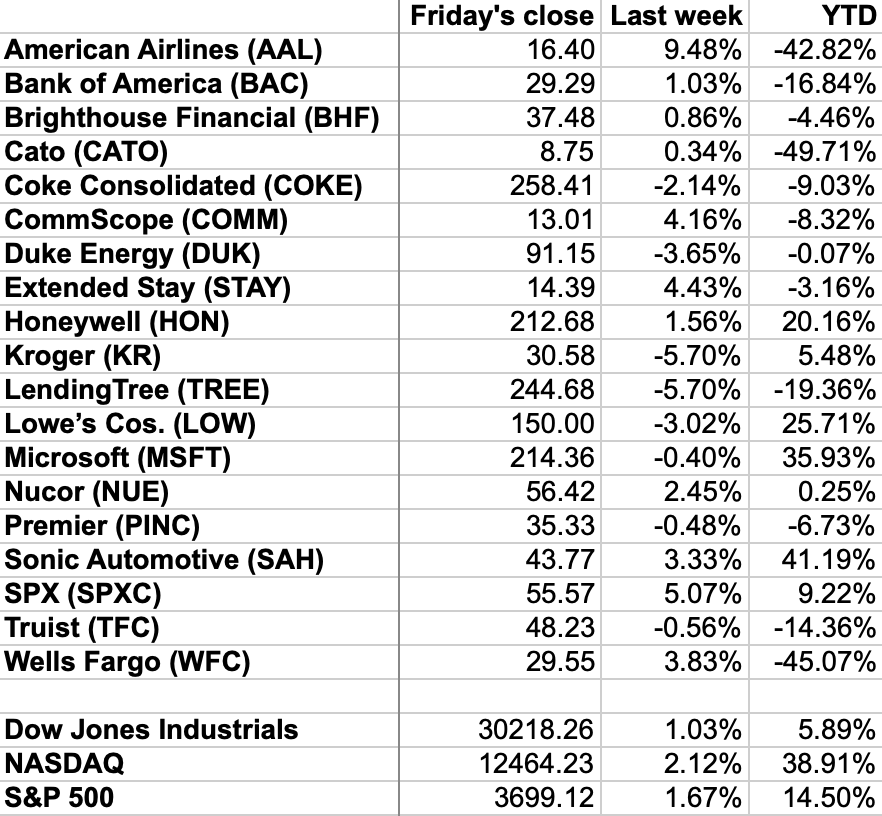Charlotte’s new transit proposal: 4 things to know
Plus: Big week ahead for Covid-related decisions; New data on Mecklenburg restaurant closings; N.C. ranked on mask use; November's rezonings; Charlotte wins war on cankerworms
Today’s Charlotte Ledger is sponsored by AccruePartners…
Charlotte faces a big choice: Higher taxes for a ‘transformational’ transit plan? Let’s break it down.
Editor’s note: This article was originally published by the UNC Charlotte Urban Institute. It is republished with permission.
by Ely Portillo
Charlotte voters could find the biggest ask in local history on their ballots next year: A $6B referendum to fund the local share of the city’s “transformational mobility network” with a new, one cent sales tax.
Charlotte Mayor Vi Lyles, the Charlotte Moves Task Force and other local leaders have signaled their support for such a measure in the fall of 2021. The referendum would pay for roughly half of the total cost, estimated at $12B over the coming decades. The local share — possibly supplemented by a property tax-backed bond — would need to be supplemented by state and federal funding.
“This is not hyperbole. It has the potential to shape our community for generations to come,” said former Charlotte Mayor Harvey Gantt, chair of the Charlotte Moves Task Force. “I think that we need to be bold.”
The task force recommended on Thursday that the city put a “One Cent for Mobility” tax increase on the ballot, which would raise about $6.6B over 30 years by taking the sales tax rate to 8.25% from the current 7.25%. That would require legislative approval from the General Assembly. The increase would exclude groceries and medication to make it less regressive.
The move comes as Charlotte faces a growing population and increasing congestion. An estimated 385,000 people are projected to move to the city by 2040, and that doesn’t account for population growth in the surrounding region. At the same time, public transit has fallen on hard times during the coronavirus pandemic, with agencies nationwide grappling with major funding shortfalls and plummeting ridership.
The next year will be crucial for the future of how we move around the Charlotte region. In addition to the city’s plans, which could extend light rail from Gaston County to Union County via the Silver Line, the first region-wide transit plan is underway by the Centralina Regional Council.
Here are four important things to keep in mind as our city gears up to consider the first significant transit tax increase in more than 20 years:
1. It’s not just about rail
Task force members have been clear that this isn't just about transit. In an auto-dependent city where a large majority of people get around by car, that could be key to winning approval (and ties in with messaging, discussed more below). Planners have emphasized that a rail network alone won’t be sufficient to head off gridlock in the region, and stress providing people options to get around.
Although new projects like the east-west Silver Line light rail are likely to be both the costliest and most attention-grabbing parts of the city’s plan, the mobility network envisioned by planners includes:
140 miles of bus rapid transit
115 miles of greenway
75 miles of bicycle network
Connecting everyone to within a half-mile of the overall network with pedestrian infrastructure
60 miles of new roadways
The sheer scope of the plan led some task force members to worry that ballooning costs (a common occurrence with large infrastructure projects) mean the sales tax alone won’t be sufficient to cover it. But Gantt said the current projections don't account for Mecklenburg's growth.
“We’re talking about $6B being raised on a one cent for mobility sales tax, and that $6B has not built in growth rates, which have historically been 3.5%,” said Gantt. “I think you will be more than sufficiently able to fund this across the county with a one-cent sales tax.”
2. There are still a lot of details to work out — especially legislative approval
The exact cost of individual projects isn’t yet known. To succeed, any plan from Charlotte would also need the state and federal governments to pick up the other half of the tab. That will require cooperation from the state legislature to allocate more funding for transit plans.
And, most importantly, the state legislature would have to agree to let Mecklenburg put a tax increase on the ballot for voters to decide. That’s by no means assured.
If the legislature balks at putting a full cent tax increase on the ballot, transit backers could pursue a smaller amount.
“If it’s not something we get full support on for one cent, maybe it’s three-quarters of a cent, or a half-cent,” said Stephen Stansbery, vice president of consultant Kimley-Horn, who has been working on the plan.
3. Messaging will be key
After Mecklenburg County failed to win approval from voters for a quarter-cent sales tax to support the arts in 2019, organizers are especially cognizant of the need to gather public support for any referendum. The Charlotte Moves Task Force has noted as much in its meetings.
“One Cent for Mobility” is a straightforward, single-source of funding, task force members said. They had previously considered a combination of local sales tax, property tax and fees to raise the local share of funding, a more complicated arrangement, and potentially a harder sell.
“Plainly stated, it’s a lot easier to get approval for one funding stream than multiple funding streams,” Stansbery said. “If we were to get support for that, it has the ability to cover our local portion.”
Deputy Charlotte City Manager and chief planner Taiwo Jaiyeoba said early polling indicates that people are more likely to approve a sales tax as well.
“There seems to be more inclination of residents towards a sales tax,” he said.
Along with the simplicity of a one cent sales tax, backers are likely to emphasize that its benefits will extend beyond transit. The Charlotte Moves Task Force discussed emphasizing that the plan will help with multiple aspects of mobility, including economic mobility, as well as keeping Charlotte economically competitive with other peer cities and helping protect the environment.
4. Other communities have been successful, but some referendums have failed
Expect to hear a lot about recent successful transit tax referendums in Los Angeles, Broward County, Fla. and Austin, Texas, all of which recently passed major transit referendums totaling billions of dollars.
But there have been plenty of cautionary tales recently as well. A referendum in Gwinnett County, Ga., failed by a narrow margin this year, as voters again rejected the idea of extending Atlanta’s regional transit system to their county. And in 2018, Nashville’s much-hyped transit plan failed by a nearly 2-to-1 margin at the polls.
Even among those cities that saw success, Charlotte might not be an apples-to-apples comparison. Jaiyeoba emphasized that Austin’s efforts were based around property taxes, for example.
“Austin is a great model, and we reference that all the time,” he said. “While Austin is a great example, it’s important to note that we might not have the same.”
So, while there are successes to note, look to Charlotte leaders to draw lessons from peer cities’ failures as well.
Ely Portillo is assistant director at the UNC Charlotte Urban Institute. He previously spent a decade as a reporter at The Charlotte Observer.
Related Ledger article:
Pros and cons: Debating Charlotte’s light rail expansion (Oct. 16, 2019)
Today’s supporting sponsor is T.R. Lawing Realty:
If you want to sponsor The Ledger in 2021, send us a note, and we will send you our media kit.
Big decisions looming on Covid response
It’s shaping up to be a week filled with crucial Covid-related decisions at the local, state and federal levels. Consider:
School board to revisit in-person learning?
The Charlotte-Mecklenburg Board of Education is scheduled to meet Tuesday, and with local Covid numbers heading higher, some board members say CMS should return to fully virtual instruction, the Observer reported on Friday.
National and international research shows that schools are not significant hubs of Covid transmission, national health officials say Covid largely does not spread in schools, top leaders of the county health department and CMS have said they are seeing few examples of transmission in schools, and state data shows no Covid clusters at CMS schools — even though there are 41,000 students in some form of in-person learning in the county, plus 19,000+ CMS employees on the job. Teachers and other CMS staff have worked hard the last few months to keep our schools safe.
Despite the lack of evidence, though, fears persist about keeping CMS elementary schools open and reopening middle and high schools, scheduled for Jan. 5. Some teachers still worry about Covid spreading in schools and say they want CMS dashboards updated more frequently, better air filtration systems and better contact tracing. Some feel stretched thin, with school staffing challenging, because of more cases and the need to quarantine. Mecklenburg’s Covid numbers have risen to a level that school leaders agreed earlier this year would prompt a discussion of closing schools.
Source: Covid-19 Ongoing Clusters in Child Care and School Settings, N.C. Department of Health and Human Services
The board meeting is scheduled for 6 p.m. Tuesday and can be viewed on the district’s Facebook page.
[Related Ledger article: “Inside the classroom: a CMS teacher’s story,” Nov. 7]
Cooper expected to decide on new restrictions
Gov. Roy Cooper’s existing executive order on Covid is scheduled to expire Friday, which means he’ll need to decide whether to keep it intact or enact more restrictive measures. The state hit new highs over the weekend on daily confirmed cases and hospitalizations.
Cooper and health and human services secretary Dr. Mandy Cohen have been signaling that they want to do more as Covid numbers increase statewide. In a statement Saturday, Cohen called North Carolina’s Covid trends “very worrisome” and said: “We are looking at what further actions we can take.” Cooper on Saturday encouraged continued mask-wearing and said on Twitter: “Our actions right now are life or death.”
Cohen and Cooper have previously said all options are on the table and have not provided specifics of what they might be considering. At a news conference two weeks ago, in response to a reporter’s question, Cooper didn’t deny that he had contemplated imposing a curfew, as some states have done. Some of the industries that might be ripe for further restrictions could include gyms and restaurants, though health officials said they are most concerned about Covid transmission in private indoors settings.
County Manager Dena Diorio, interviewed on WBT radio’s “Big Story” on Sunday, said that because of the progress with a vaccine, “I find it hard to believe that we’ll go back into another lockdown.”
Of the 50 states, North Carolina ranks #43 in the country on new cases per capita in the last 7 days and #41 in deaths per capita, according to The New York Times.
Cooper typically holds news conferences on Tuesdays or Wednesdays.
New federal Covid relief bill?
Prospects seem to be improving for another Covid relief bill from Washington, with leaders of both parties seeming to be warming to making a deal.
A lot of the details remain to be worked out, but such a bill could include enhanced jobless benefits, more loans or grants to businesses and money for schools, healthcare providers and state and local governments. —TM
New Mecklenburg data on restaurant closings
About 1 out of every 7 restaurants in Mecklenburg County were closed when health inspectors went to visit in the last few months, according to data provided to The Ledger by the county.
Everybody knows that the pandemic has hurt the restaurant industry, but it’s been hard to know precisely how widespread the pain has been locally — other than the occasional anecdotes and news stories when a favorite spot closes.
But county health inspection data provides a clue. Since July 1, health inspectors have found 511 restaurants and food stands with valid permits that are closed, out of the 3,725 establishments with permits — or about 14%. The county doesn’t know if the closed restaurants are shut temporarily or permanently, said Daniel Ortiz, the county’s environmental health director with the health department. Inspectors visit restaurants every 3 to 6 months, depending on a number of factors.
In ordinary years, inspectors find closed restaurants, too — though fewer of them. In the last pre-Covid 12-month period tracked by the county, between July 2018 and June 2019, inspectors found 346 closed restaurants out of 3,590 permitted, or 10%.
In other words, inspectors in the last five months encountered 165 more closed restaurants than they did in the 12-month pre-Covid period.
Still opening: But openings of new restaurants seem to be on a pre-Covid pace. Since July 1, there have been 195 new permits issued, the county numbers show — an average of about 40 per month. That’s about the same rate as the previous two years. (There were 478 in fiscal year 2020 and 462 in 2019.) —TM
November’s hot rezoning 🔥 action
Townhomes proposed to replace single-family houses in Ballantyne … affordable housing on West Boulevard … what’s replacing a south Charlotte nursery? … changes coming to The Metropolitan.
All that excitement and more are in November’s rezoning filings — which are not yet on the city’s main rezoning website. But we have them, available exclusively to The Ledger’s paying subscribers:
In brief:
Middle of the pack on masks: North Carolina ranks 23rd in the country in both mask-wearing and social distancing, according to a new national survey conducted by four universities. South Carolina is #38 in social distancing and #37 in mask-wearing. Nationally, researchers found that “social distancing has decreased dramatically since the spring, while mask wearing has increased.”
Virtual school attendance: Only 81% of N.C. students in remote learning are regularly attending classes, according to the Department of Public Instruction. In Charlotte, the absentee rates tend to be highest in schools with high proportions of low-income and minority students. (Longleaf Politics)
McAdenville lights up: McAdenville kicked off the first full weekend of its annual lights display on Saturday, with a few small changes. The tree lighting and yule log ceremonies and the 5K were held virtually, and the lake is not lit. Residents said they were happy to see the lights return for the 65th year: “It’s the community spirit and really the good will that exists here because McAdenville is a great town but more importantly it’s got great people,” one McAdenville native said. The lights are on from 5:30 p.m. to 10 p.m. through Dec. 26. (WBTV)
Cankerworms defeated: Charlotte’s willow oak trees do not need anti-cankerworm bands this year, local arborists and researchers say, because the annoying small green creatures have been virtually wiped out. “Local arborists suspect some late frosts in the last few years have killed off many of the newly hatched caterpillars,” TreesCharlotte reported, and previous tree-banding helped, too: At 163 locations tracked by the city, the number of cankerworms fell from 38,948 in 2016 to 117 this year. (CharlotteFive)
In memoriam: William Charles Campbell, one of Charlotte’s top healthcare real estate executives, passed away last week at age 54. He was CEO of Flagship Healthcare Properties in SouthPark. He had also served on the boards of the Mecklenburg County Council of the Boy Scouts of America and the McColl Center for Visual Arts. (Legacy.com)
Ledger corner
A few announcements from command central:
Mark your calendars. We’re having a Ledger holiday party, and all our paying subscribers are invited. Alas, it will be virtual this year. Drop in online on Thursday, Dec. 17, from 5-7 p.m. Details to come. And we are working on drink specials, as we did with our online happy hour a month ago, which was a big hit.
Ledger gear. It’s the gift-giving time of year. How about a Ledger hoodie or crewneck sweatshirt? Nothing says you’re essential better than Ledger threads that literally say “essential.” T-shirts also available. Order by Wednesday to guarantee Christmas delivery.
Gift subscriptions. Why not drop some local-news knowledge on a friend or loved-one? What says “I love you” more than a $99 yearly subscription? Also available at the “I like you” $9 level for one month.
Taking stock
Unless you are a day trader, checking your stocks daily is unhealthy. So how about weekly? How local stocks of note fared last week (through Friday’s close), and year to date:
Need to sign up for this e-newsletter? We offer free and paid subscription plans:
The Charlotte Ledger is an e-newsletter and website publishing timely, informative, and interesting local business-y news and analysis Mondays, Wednesdays, Fridays and Saturdays, except holidays and as noted. We strive for fairness and accuracy and will correct all known errors. The content reflects the independent editorial judgment of The Charlotte Ledger. Any advertising, paid marketing, or sponsored content will be clearly labeled.
Got a news tip? Think we missed something? Drop us a line at editor@cltledger.com and let us know.
Like what we are doing? Feel free to forward this along and to tell a friend.
Sponsorship information: email editor@cltledger.com.
Executive editor: Tony Mecia; Managing editor: Cristina Bolling; Contributing editor: Tim Whitmire, CXN Advisory; Reporting intern: David Griffith







